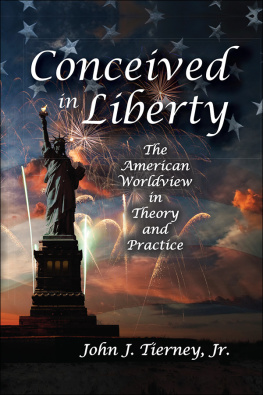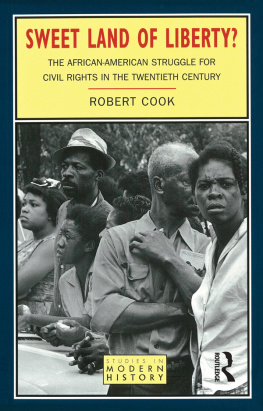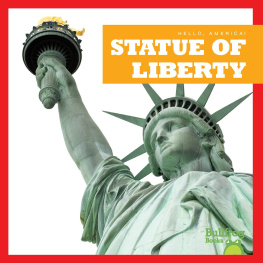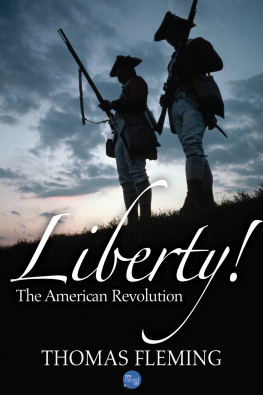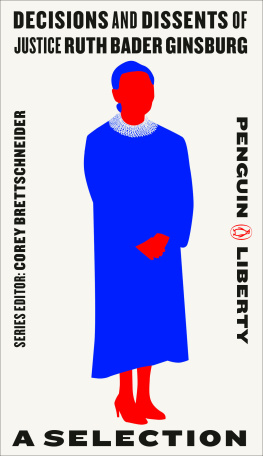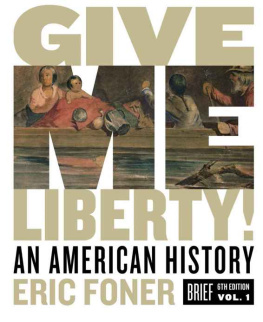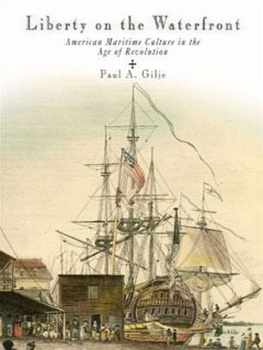First published 2016 by Transaction Publishers
Published 2017 by Routledge
2 Park Square, Milton Park, Abingdon, Oxon OX14 4RN
711 Third Avenue, New York, NY 10017, USA
Routledge is an imprint of the Taylor & Francis Group, an informa business
Copyright 2016 by Taylor & Francis.
All rights reserved. No part of this book may be reprinted or reproduced or utilised in any form or by any electronic, mechanical, or other means, now known or hereafter invented, including photocopying and recording, or in any information storage or retrieval system, without permission in writing from the publishers.
Notice:
Product or corporate names may be trademarks or registered trademarks, and are used only for identification and explanation without intent to infringe.
Library of Congress Catalog Number: 2016010924
Library of Congress Cataloging-in-Publication Data
Names: Tierney, John J. (John Joseph), 1940- author.
Title: Conceived in liberty : the American worldview in theory and practice / John J. Tierney, Jr.
Description: New Brunswick, New Jersey : Transaction Publishers, [2016] | Includes index.
Identifiers: LCCN 2016010924 (print) | LCCN 2016018366 (ebook) | ISBN 9781412863261 (hardcover) | ISBN 9781412863582 (eBook)
Subjects: LCSH: Liberty--United States. | Liberty--Philosophy. | Exceptionalism--United States. | National characteristics, American. | United States--Civilization. | United States--History. | United States--Politics and government.
Classification: LCC JC599.U5 T54 2016 (print) | LCC JC599.U5 (ebook) | DDC 320.01/1--dc23
LC record available at https://lccn.loc.gov/2016010924
ISBN 13: 978-1-4128-6326-1 (hbk)
This book is dedicated to The Institute of World Politics, a
graduate school in Washington, D.C., and in particular the
philosophic vision behind its founding, and its devoted
personalities who have rekindled the fire of principled statecraft
in America for more than twenty-five years.
Fourscore and seven years ago, our fathers brought forth
on this continent a new nation, conceived in liberty...
Abraham Lincoln, 1863
As this Preface is being written (August 2015) the Republicans have just completed their marathon seventeen-candidate primary debate for the 2016 presidential campaign. Prominent among the several remarks were references to a quality of political life labeled singularly American to which candidates and the electorate were urged to adhere lest they lose next year or, worse, lest the country irreparably decline. Jefferson called it the Empire of Liberty, while much later journalist magnate Henry Luce called it The American Century.
Typical of such remarks at the event were those of Senator Marco Rubio who emphasized the powerful heritage thrust upon the country well into the twenty-first century:
My father was a bartender. And the journey from the back of that bar to this stage tonight, to me, is the essence of the American dream. It is what makes our nation different.... I run for president because I believe that we cant just save the American dream; we can expand it to reach more people and change more lives than ever before. And thats why Im asking for your vote. So we can make America greater than it has ever been. And to make this century a new American Century.
This book is about that statement (rhetoric) and the thousands of similar ones that have defined the American political landscape from the very beginning. The subject is political liberty and the accompanying cultural energy that releases a whole range of national aspirations and directions, especially the unique (exceptional) American role in advancing liberty as a global destination. This is usually described as exporting democracy but democracy is a method of government dependent upon liberty, not the other way around.
This is decidedly not a book on political philosophy, the Declaration of Independence, the Constitution, Bill of Rights, Federalist Papers, or any other substantive region of US political history (otherwise it would be quite a short book indeed). This is more rhetorical and emotional than philosophical since if politicians en masse still highlight its message in 2015, it has to have more than passing notice to average people and it also has to originate from a deep and penetrating source of the American political character. Philosophers have examined the intellectual source of this phenomenon since ancient Greece; Conceived in Liberty will trace its application to American political history, especially as understood by the common man (the term itself is a product of liberty).
As a profound reference to the deep roots of liberty inside the American psyche I was struck by the thoughts of an obscure American college athlete, Joe Rantz, viewing the Statue of Liberty for the first time in 1936. As chronicled by bestselling author Daniel Brown (The Boys in the Boat, Penguin 2013) Rantz was on his way to Berlin and a gold medal for the USA Olympic crew team. Stopping briefly in New York his thoughts on the meaning of liberty were preserved by Brown:
For Joe, the moment of epiphany came on the eighty-sixth floor of the new Empire State Building.... He dropped a nickel in a telescope for a better view of the Brooklyn Bridge, then swept across Lower Manhattan and out to the distant Statue of Liberty. In a few days, he would be sailing to a place where as he understood it, liberty was not a given, where it seemed to be under some kind of assault. The realization that was settling on all the boys settled on Joe.
They were now representative of something much larger than themselvesa way of life, a shared set of values. Liberty was perhaps the more fundamental of those values. But the things that held them togethertrust of each other, mutual respect, humility, fair play, watching out for one anotherthose were also part of what America meant to all of them. And right along with a passion for liberty, those were the things they were about to take to Berlin and lay before the world when they took to the water at Grunau. (pp. 28889)
This book takes off from there. The focus is on Weltanschauung or worldview, how society defines itself on the world stage. This is more of a profile than an in-depth inquiry as to the intellectual validity of the expression. A profile describes how one wants to appear to others (dress, suit). It can distort and exaggerate but it cannot hide. In that respect it is superficial but this problem in no way denies its appeal. Weltanschauung does not even necessarily have to be fully believed and it is rarely analyzed in depth by its millions of adherents. But as this text will show, repetition over three centuries is enough to demonstrate conviction. That is all that is necessary. Scholars may demonstrate its shortcomings but that is why they are academics.
Critics will say that the country is too diverse and complex to narrow its worldview to a single concept. Does this mean that the worldview of 1789 cannot possibly fit a 2015 society? Can a country outgrow itself? To this charge I appeal to biology: a child can have but one mother (the word conceived is no accident, either now nor at Gettysburg where it originated). Brilliant volumes have demonstrated the multiple strains of the American political character and its impact upon the world and some of these are reflected throughout this text. However, most of these strains show what the country has done; liberty, I assert, shows why. It is singular and consistent even though it may adopt several variations in practice. The notion that the idea comes automatically, that is, minus reflection, indicates its hold over the polity; one that really cannot be broken. Most causes have what is called a root. To this, I also assert, that political liberty is Americas root; all others are but branches.

